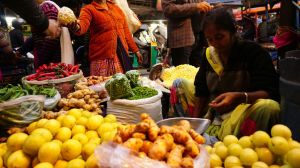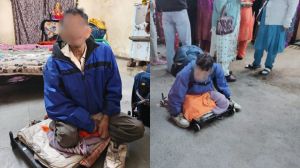Perfect B-Sense
A business school for rural women has helped turn around lives, fortunes

A business school for rural women has helped turn around lives, fortunes
It has hardly rained this year in the drought-stricken Mhaswad village of Satara district yet Indutai Raut, in her fifties, is happy. Her family has been successful in tiding over these difficult months without giving in to the moneylenders. What helped was her decision to deposit the Rs 3,000 she earned from her tailoring business in the Mann Deshi Mahila Sahakari Bank, a cooperative bank run by and for women in the village. Indutai is an example of how rural entrepreneurship among women can sometimes turn around fortunes, even lives.
Indutai set up her tailoring business after a 10-day course in financial management at the Mann Deshi Udyogini MDU, a special business school set up in 1996 for clients of the Mahila Bank. The course was specially designed so that Indutai, who has never been to school, could develop her entrepreneurial skills without getting bogged down by business jargon. The same course helped Jayashree Bagal, who is hearing impaired, earn a living too. Today, she helps her husband run a boutique in Mumbai.
Besides Indutai and Jayashree, the business school has among its alumni Vanita Pise, who bagged the Woman Exemplar Award from the Prime Minister in 2006. Pise is a champion of the self-help movement, having set up 35 self-help groups in Mhaswad village. This ninth grader, who did a short course from the institute and is one of the early clients of the bank, now helps women make paper cups for prasad. She says microfinance is easy on borrowers. 8220;Microfinance allows you to work to your strength and earn profits as well. It is different as you start with a small loan. Once the profits start coming in, you can move on to bigger loans,8221; says Pise, proud that she can now supports her family of four.
These self-made women and their rural business school8212;set up by Chetna Gala Sinha with a 17,500 grant from HSBC8212;have now caught the attention of business students around the world. Students of France8217;s ICN Business School are in the village on a two-month internship programme to study the concept of rural entrepreneurship and micro credit. Earlier, students from Johns Hopkins University SAIS and Harvard Kennedy School had spent a couple of months trying to understand the challenges faced by these women.
Sinha, an economist and activist who founded the Sahakari Bank, set up this B-school as she wanted the clients of her bank to be 8220;self-sufficient and combine economic activity with educational tools and healthcare that are necessary to lead a good life8221;.
8220;I am a Yale alumni and Yale has been encouraging students to come here and understand what makes women entrepreneurs in rural India click,8221; she says. With requests pouring in from the University of Michigan Business School and the Yale School of Management, Sinha sees it as an opportunity to spread the word to other parts of the world. 8220;These foreign students also help by working on the entrepreneurship programmes run by MDU,8221; she says.
Sinha8217;s big moment came when MDU found a mention in the Economist8217;s May 2007 Global Executive Education report that ranked the rural B-school alongside the Harvard Business School.
Padma Kuber, coordinator of these programmes, explains that the 24-odd courses are designed according to the needs of the women. 8220;We have trainers and sometimes our students end up training the other members,8221; said Kuber. The course fee is an affordable Rs 100-150.
The school coaches women and girls with no formal education in entrepreneurship, accountancy, bank finance, marketing skills and supports them in running independent enterprises as vendors, screen printers, bag makers and photographers. Funds for the projects come from HSBC. Sinha, who is also founder and chairperson of the rural bank, says at least 6,000 projects have been financed so far.
The Mhaswad bank operates across five districts and is a fully computerised bank that offers weekly and fortnightly credit and savings schemes to its customers, most of whom are daily or weekly wage earners. Unlike other banks, it also provides daily loans for buying vegetables and fruits. With 48,000 members, the bank enjoys a repayment rate of over 95 per cent. The bank has helped create 16,720 women entrepreneurs in the region around Mhaswad. The clientele is made up of poor women with annual incomes averaging Rs 22,000.
Luka Heindricks of the ICN Business School is helping the bank and MDU with some technical inputs and is even working on a programme to introduce the microcredit system back home. 8220;It has been a very enriching stay here and these women taught us a lot,8221; he says.
MDU has other plans too8212;it is set to launch a community radio project in September. Just like the bank and the school, the community radio too will be run by women, said Padma Kuber, who is in charge of the project.
Vaishali Khamke, who was cleared for the radio programme after a voice test, is elated. 8220;As a child, I have worked at a radio station. I am very excited about this,8221; says Khamke.
- 01
- 02
- 03
- 04
- 05































